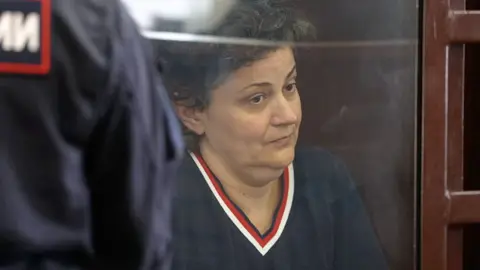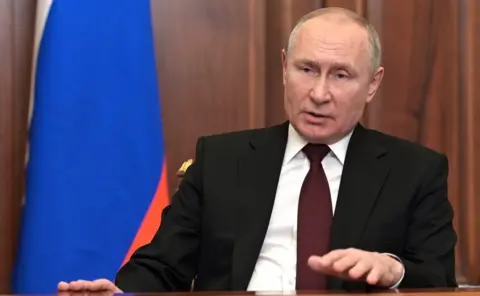
I’m sitting in a courtroom in the town of Pushkin, 400 miles north-west of Moscow.
Opposite me is the “aquarium” – the glass and metal box where the defendant is locked, the courtroom cage that makes anyone on trial in Russia look like a dangerous criminal.
Behind the glass is Anna Alexandrova. The 46-year-old hairdresser has been charged with “the public dissemination of knowingly false information about the use of the Armed Forces of the Russian Federation”.
Put simply, spreading fake news about the Russian army. The charge relates to messages and social media posts she has been accused of sending.
The key prosecution witness is here, too – Anna’s neighbour.
Since Russia’s full-scale invasion of Ukraine there have been regular reports of Russians reporting neighbours, colleagues and acquaintances to the police over alleged anti-war statements.
Denunciations have led to arrests, prosecutions and, in some cases, long prison sentences.
But why has snitching become commonplace? And what are the implications for Russian society?
To find out, I have spoken to a number of Russians caught up in this, including a doctor informed on by her patient and an 87-year-old man who was forced off a bus and dragged to the police.
Back at the court in Pushkin, Anna Alexandrova’s neighbour, Irina Sergeyeva, is sitting two rows in front of me with her mother Natalya. They live in the house next to Anna’s.
The two families were once on good terms but have fallen out. Badly.
During a break in proceedings, I ask Natalya why.
“She started sending [my daughter] pictures from the special military operation [Russia’s war in Ukraine],” claims Natalya. “Images of soldiers’ bodies torn apart, and tanks on fire.”
“I wrote to the prosecutor’s office about this,” Natalya adds. “The images make you want to cry.”
Anna denies sending any of the images and messages in question. According to her lawyer, if convicted, she faces up to 15 years in prison.
However, as I would discover, there was more to the tale of Anna and Irina than met the eye.
Signals from above
Free speech in Russia was already under attack, but days after the invasion of Ukraine in February 2022, Vladimir Putin took it to a whole new level.
A few days after ordering Russian troops into Ukraine for what he called a “special military operation”, President Putin signed into law repressive legislation designed to silence or punish criticism.
Russians could now be prosecuted for “discrediting the use of the Russian armed forces” and receive long prison sentences for spreading “knowingly false information” about the army.

The authorities also signalled a hunt for internal enemies. President Putin declared:
“…any nation, and even more so the Russian people, will always be able to distinguish true patriots from scum and traitors and will simply spit them out like an insect in their mouth, spit them onto the pavement. I am convinced that a natural and necessary self-detoxification of society like this will strengthen our country, our solidarity and cohesion…”
In this atmosphere of “us” against “them”, reports started coming in of Russians snitching on Russians for opposing the war in Ukraine – of students informing on teachers, professors on students, work colleagues on each other.
Not all complaints have made it to court. But in some cases, Russia’s harsh new laws have been used to prosecute alleged offenders.
This has revived memories of the Soviet past when denunciation was actively encouraged by the authorities. Under dictator Joseph Stalin, the prison camps, or Gulag, were full of victims who had been snitched on by their fellow citizens.
“What I find remarkable is how quickly Russian genetic memory has come back, and how people who didn’t live in those times suddenly act as if they did,” says Nina Khrushcheva, a Russian-American professor of International Affairs at The New School in New York.
“Suddenly they are squealing on others. It is a Soviet practice but it’s also something about the Russian genetic code, of fear, of trying to protect themselves at the expense of others.”
Demons from below
But this is only half the story.
The more I learn about the case of the hairdresser, Anna, the more I realise that denunciation isn’t solely a product of fear and self-preservation.
Sometimes personal rivalries, or personal interest, are at play.
“The so-called ‘political’ articles of the criminal code have become a very convenient way to resolve conflicts between neighbours,” suggests Anna’s lawyer Anastasia Pilipenko.
“This particular case began with a run-of-the mill domestic squabble. One side went to the police but got nowhere. That only changed when the charge of ‘fake news about the army’ appeared.”
In reality, the conflict between Anna and Irina began, not with social media messages, but a row over land.
The two families had originally battled together to protect a local forest from developers. Things changed when Irina tried to rent a plot. She said she needed it for grazing goats.
“[Anna] harboured a grudge,” says Irina. “She called us fraudsters. She claimed we would buy the land and sell it on to developers. I told her that was nonsense. Then the floodgates opened.”

 Leak News
Leak News
